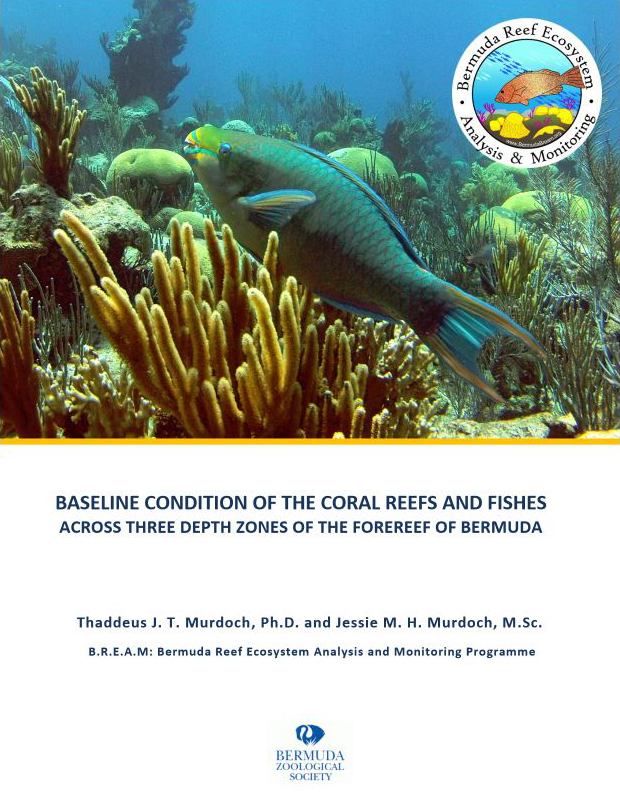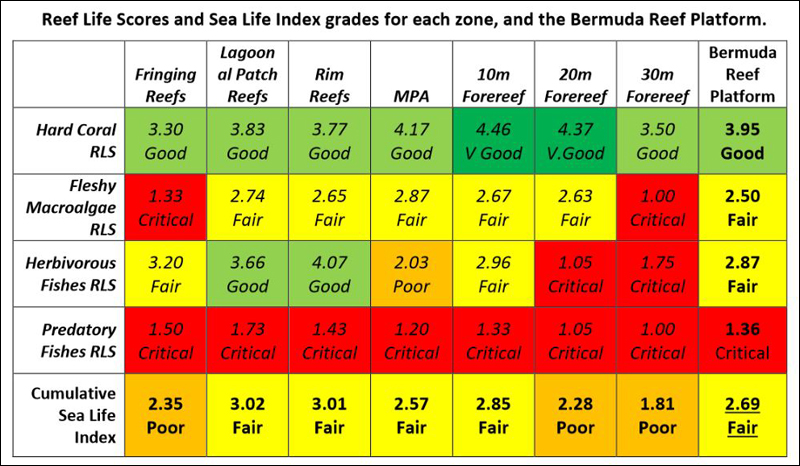Bermuda Coral Reef Health Report Released
Historically abundant predatory fishes such as groupers and snappers are rare and at critically low numbers on Bermuda reefs based on international standards, according to a recently released report by Bermudian scientists Thaddeus and Jessie Murdoch through the Bermuda Reef Ecosystem Assessment and Mapping [BREAM] Programme.
In good news, however, hard corals are at good to very good levels across most deep reefs, and the protected parrotfish appear to have recovered from overfishing in the 1980s. Bermuda also has high numbers of plant-eating fishes across the lagoon, forereef and rim, which contribute to healthy reefs by preventing marine plants from overgrowing hard corals.
The report – ‘Baseline Condition of the Coral Reefs and Fishes Across Three Depth Zones of the Forereef of Bermuda’ – is available at BermudaBREAM.org.
A spokesperson said, “The report describes information collected from 2004 to 2011 by the Murdochs and their team of local and international scientists and graduate students.
“Over this period of time, the BREAM crew measured the amount of corals, marine plants, plant-eating fishes and predatory fishes at over 180 reefs located across all of Bermuda’s reef habitats.
“Funding and support for the research was provided by Partner Re; the Overseas Territories Environmental Programme Fund at the UK Foreign & Commonwealth Office; the Bermuda Government; the Bermuda Zoological Society; the Stempel Foundation; and Murdoch Marine Ltd.
“The forereef of Bermuda surrounds both the island and its lagoon and encompasses an area of about 400 sq km. The coral-rich forereef protects Bermuda from storms, enhances tourism experiences, generates sand for our beaches, and provides habitats for the fishes we like to eat.
“The BREAM report provides clear evidence that the cover of corals remains high at forereef locations, but is lower at deeper depths within the lagoon and particularly at nearshore reefs where marine plants are overly abundant and plant-eating fishes are scarce. Predatory and plant-eating fishes are critical to maintaining healthy reefs.
Dr. Thad Murdoch believes the loss of predatory fishes is cause for alarm, saying, “Large predators like black grouper carry out important work by managing the numbers of small and large parrotfish that live on the reef.
“Smaller predatory fishes such as red hind, coney and grey snappers are also needed, as they keep coral-killing damselfish from spreading across lagoonal patch reefs.
“Bermuda’s coral reefs protect the Island, give us food, and provide exciting experiences for locals and tourists alike. However, our reefs, along with those across the world, face destruction from an increasingly acidic ocean and increasingly violent storms.
“Our reefs can face these serious threats, but only when predatory fishes like grouper and snapper, as well as plant-eating fish like parrotfish and surgeonfish, are abundant, marine seaweeds are sparse, and hard corals are healthy.
“Commercial and recreational fishing annually constitute only a very small portion of economic value generated by the services provided by Bermuda’s coral reefs to our society. However, we oversee the condition of our reefs as if they are primarily a fisheries concern. Reef condition is really a tourism and coastal protection issue, and should be managed accordingly.”
According to Dr. Thad Murdoch, Bermuda can restore predatory fish populations by restricting the rate at which commercial and recreational fishers catch groupers and snappers, limiting the sale of key predatory fishes during their spawning season, expanding the seasonal prohibition and extent of protected spawning areas where necessary, and enhancing marine resource enforcement.
He said, “Our centuries-old Bermuda reef fishery, and the multigenerational livelihoods that it provides, can only persist if we maintain the numbers of our breeding groupers and snappers.
“Marine protected areas are one way to invest in our reefs, and they provide a valuable return in the form of a constant supply of fish that leave the protected areas and which we can eat.
“In an era of rising sea level, loss of reef structure will allow higher levels of storm waves to damage and remove our coastal properties and beaches, while also reducing the visual appeal of Bermuda’s waters to both visitors and locals.”
Jonathan Starling, Executive Director of Greenrock, said, “The BermudaBREAM.org Baseline Report makes for some distressing reading for anyone concerned about the environment.
“We knew that fish catches were too high in the 1970s and had not recovered fully in the 1980s – what this report indicates is that the large predatory fishes, the apex predators of our waters, still haven’t recovered and remain at critical population levels.
“Apex predators such as our groupers/rockfish are crucial for our nearshore ecosystems – they are the tigers or lions of our local environment.
“The ocean is the cornerstone of Earth’s life support system – it shapes climate and the weather – and our nearshore not only feeds us but protects us from storm events. The argument is simple – if we lose our large predatory fish, then we will lose our coral reefs, and that will have dire consequences for our future.
“Environmentalists are fond of the saying ‘think globally, act locally’. That is very relevant to what this report speaks to. Our reefs are already stressed – and likely to see more stress – due to rising sea temperatures, rising sea levels, ocean acidification and ocean deoxygenation – all consequences of global climate change.
“Added to this stress is the lionfish invasion and the critical population levels of our large predators. We can act locally by actively caring for our nearshore and taking steps to reduce our own contributions to greenhouse gases.”
To learn more about the BREAM programme, and to view the baseline reef status report in full, visit BermudaBREAM.org.
Read More About
Category: All, Environment, News






Let’s hope that all their hard work pays off and the government of Bermuda will actually listen and follow the recommendations. So far, neither the PLP nor the OBA has put the environment to the forefront in Bermuda. Environmental issues should be the top priority of governments all over the world.
I will say that I was extremely disappointed and saddened to see that Styrofoam containers were being used at the AG Show for food. How ironic that the location of the environmental headquarters is allowing its use on their property.
So…… what is the Government’s reaction to this report??? Is it going to actually do something to protect our reef fishes and our patch of ocean or are they simply sit on it and hope the problem will go away?? (hint: it wont)
The fact that predatory fish levels are deemed ‘critical’ should be a wake up call to the government, whoever it may be. We need to have some laws in place to allow populations to recover before it is too late. I want these to be around for my children and future generations of Bermudians!